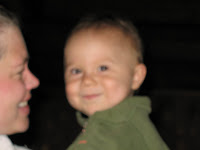 There’s something about Cormac McCarthy’s attention to the sparseness of punctuation and sentence structure that works exceptionally well in No Country for Old Men. It’s as if one comma would ruin the flow of the language and pull your attention away from how the characters’ voices are conceptualized. And I’m consistently amazed at how he manages to ensure the flow of dialogue without quotations, or truly, any way of knowing who’s speaking beyond the voices you create for them in your own head.
There’s something about Cormac McCarthy’s attention to the sparseness of punctuation and sentence structure that works exceptionally well in No Country for Old Men. It’s as if one comma would ruin the flow of the language and pull your attention away from how the characters’ voices are conceptualized. And I’m consistently amazed at how he manages to ensure the flow of dialogue without quotations, or truly, any way of knowing who’s speaking beyond the voices you create for them in your own head.
As a youngish man goes for hunting in the back country near the Rio Grande, he discovers the spoils of a drug deal gone bad: lots of product, even more money. Leaving the product and picking up the cash, Llewelyn Moss turns around and makes his way out of the back country. He gets back in his truck, and drives home to his bride, who’s but a wisp older than sixteen.
[And I’m paraphrasing]
She drawls, “What’s in the bag”
“A pile of money.”
And at that moment, whether they know it or not, their lives change forever.
The blunt force trauma of this story follows as such: Llewelyn, having stolen the money from an active drug cartel, is hunted down by the killer Anton Chigurh on one side of the law and by the old-time police chief Ed Tom Bell on the other. Seen from either direction, the story is sure as sh*t not going to come down in the favour of poor Lleweyln, nor is it going to turn out alright for Carla Jean, his wife. The chase on either side is brutal, dedicated, bloody and violent as hell.
It’s hard to say but I’m not sure if there’s a living writer (non-Canadian) that I admire these days as much as McCarthy—but only, truly, for these latest few books. All the Pretty Horses, with its majestic first sentence, as I’ve said here before, remains one of my all-time favourite books. Now, as you know, I was completely captivated by The Road. But No Country For Old Men blew me away. No one writes violence like McCarthy, and turns something that’s often mocked in the popular media, or blown out in ways that ensure any impact of it gets lost between big guns and lots of useless fake punches, into literature.
The character of Ed Tom, the local police chief charged with not only unraveling the mystery of all the dead drug dealers, but also attempting to find Llewelyn before he’s got no life left to live, remains a moral compass behind the entire book. Each chapter begins with a long, almost internal section from his point of view, where you can truly see how the country has started to make the changes into society as we know it today. It’s a very particular vantage point, sitting on the cusp just before the world completely changes, and he seems bittersweet at best when coming to terms with the end of his life.
Ed Tom, as with many of the characters, acts stoically when faced with a situation that seems quite simply beyond the grasp of what everyday life prepares you for. The novel openly contemplates the idea that a secret, life lesson, sense of karma, or fairness itself will truly be obliterated by the sheer force of the universe. So much of the narrative plays out this philosophical ideal by the scenes of truly brutal violence, but also in the sheer fact that, as McCarthy proposed in his Oprah interview, some people are simply born luckier than others.
Of course I’m preparing myself for the movie adaption. By all accounts it’s apparently bloody brilliant, the Coen brothers at their finest, but I still think the story will lose something that only the inner workings of Ed Tom’s mind can relay. So before everyone heads out during Oscar season to work out their picks, I highly recommend reading this book before thoughts of Tommy Lee Jones, Javier Bardem and Josh Brolin fill up your imagination.
Oh, and there’s a slight error in the cover copy that bugged me all through the book, it says something along the lines of ‘set in our modern time’ or something when it’s actually a period piece (to an extent). The book actually takes place in the early 1980s (or just 1980), which is just another reason to pay homage to McCarthy’s talents as he doesn’t have to come right out and say this, but it’s totally inferred by the cars the characters drive and the technology they use.
PHOTO IN CONTEXT: I left the book up north and feel very strongly that it belongs in the cottage library (should there ever truly be one), and so I’m posting a photo of the moon on the night I finished reading the novel. I’m telling you, as lame as my picture is, it was one of the most beautiful moons I had ever seen. I stood outside and took a dozen pictures trying to find just one that captured the tenor of the clouds and the songs of the night, and honestly think I failed—but I sure hope you get the picture.




